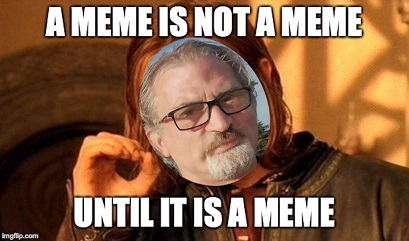Table of Contents
What Are Memes? | Meme Definition & Meaning

An Internet meme is a unique type of online media that spreads quickly, usually through social media. Memes are constantly evolving pictures, movies, or GIFs that are intriguing or humorous. It refers to a common thought or emotion, generally humor, that is associated with a culture or subculture.
A meme is a cultural inside joke that is easily recognized by a large number of people. Memes have evolved into a cultural phenomenon that is now used daily by social media users.
History – What Are Memes?
Richard Dawkins, a scientist, coined the term “meme” in 1976. He saw parallels between genes and memes because thoughts and concepts move quickly among people and evolve as they do, which is analogous to the process of gene mutation.
Hearing about the meme or seeing it, understanding it, modifying the context to match your world view, and using it in whichever way the user sees fit are the stages of a meme.
The earliest meme, the dancing baby GIF, or “Baby Cha Cha,” was created in 1996. It went viral and was even broadcast on national television. Meme’s popularity, on the other hand, didn’t take off until the 2010s.
The first memes developed might be popular for months or even years, but owing to increased competition and development, meme popularity has declined. Memes can convey a lot more information than plain text, which is why they’re so popular.
The Origins of the Word “Meme”
In his best-selling 1976 book The Selfish Gene, evolutionary biologist Richard Dawkins coined the term “meme” (rhymes with “team”).
He used the term meme to describe an idea, behavior, or style that quickly spreads from person to person in culture, despite having no idea of its future internet-related context. In his book, he compares meme transmission to the spreading of a virus. The word meme is derived from the Greek word mimeme, which means “to imitate.”
Dawkins encouraged the adoption of the term meme into the digital realm decades later. He claims that the new interpretation isn’t that dissimilar from his previous explanation.
Memes used to be the territory of young people in their twenties. Memes, on the other hand, have been adopted by internet users of all ages and degrees of digital-savvy to convey their feelings.
What is the correct pronunciation of meme?
According to the Oxford English Dictionary and the BBC’s Pronunciation Unit, the proper pronunciation of “meme” is “meem,” not “may may” or “mee mee.”
What Characterizes a Meme? What Makes a Meme
Memes have become a worldwide phenomenon. People will share a meme more if it resonates with them, and it will spread further. Memes are usually amusing, but they frequently include sardonic political or social commentary.
The purpose of meme creation can vary, from shock value to teaching a lesson. Occasionally, a single photo or short video will elicit hundreds of hilarious responses. A meme may appeal to a small group of people at times, or it may appeal to a large group of people at other times.
What is considered a meme?
1: within a culture, an idea, behavior, style, or usage spreads from person to person.
2: a hilarious object (such as a captioned photo or video) or a genre of items that is extensively shared online, particularly via social media.
Why is it called a meme?
Richard Dawkins, a British evolutionary biologist, coined the term meme (from the Greek mimema, which means “to imitate”) in his book The Selfish Gene in 1976. When one individual copies a unit of cultural information that makes up a meme from another person, this is known as meme replication and transmission.
Interesting Facts About Memes
While memes are entertaining on their own, we thought you would enjoy the following amusing facts about memes before diving into our list of the 10 most popular:
•The quantity of memes on the internet is impossible to count. There are so many already out there, and so many more are being created every day, that counting them all would take a lifetime. On the internet, there are an unlimited number of memes.
• In Richard Dawkins’ book The Selfish Gene, the term “meme” was originally used to describe any “cultural item that spreads fast and uncontrollably inside and between civilizations.” He was one of the first to make the connection between cultural phenomena and viral infections, paving the way for the concept of “going viral.”
• The term “meme” has overtaken Jesus as the most popular search phrase.
• Political memes account for over 60% of all memes.
What Is the Most Famous Meme? the 8 Most Popular Memes of All Time
- LOLCats
- Squinting Fry
- Success Kid
- Interestingly, the story of this meme goes a bit deeper
- Trump Signs an Executive Order
- Scumbag Steve
- Evil Kermit
- Grumpy Cat
What are the three properties of a meme?
The three characteristics that make it successful: are longevity, fecundity, and copy-fidelity.
What are the several ways memes are used to communicate?
Memes are a means for people in our culture to exchange their sentiments, humor, and ideas. We are fascinated by memes because they are relatable, and the audience thrives on things with which they can identify.
Memes have become a common form of communication in our society, and they will continue to rise in popularity.
Meme categories – Types of memes
•Image macro meme:
An image with block text that is simple and expressive. It’s meant to invoke an emotional state and acknowledge a similar experience shared between viewer and creator.
• GIF: A continuously looping animated image or soundless video. As social networking sites like Facebook and Twitter were launched, GIFs grew increasingly popular.
• Video: Since the launch of Youtube in 2005, video memes have been increasingly popular.
• Advice animals: A rainbow background with an animal’s head photoshopped on top of it.
• Demotivator: Images with a black background and white writing that are inspirational or motivational.
• Comics: Similar to a newspaper layout, comics contain many images and texts in a block structure.
• Dank memes: One-of-a-kind memes that deviate from the standard format. Dank memes are frequently built on nonsense and necessitate investigation for the layperson to appreciate their context.
The Bottom Line
Memes are always changing.
We can accomplish so many things thanks to the internet, but we must all be grateful for memes.
Memes cover a wide range of topics, from basic, everyday topics to major life and world events. Every day more is made and shared, and new content is continually available.
Make your meme using Meme Generator if you’re inspired by a picture or video you encounter and see if it resonates with others.
Visit Know Your Memetolearn more about a meme or receive ideas
